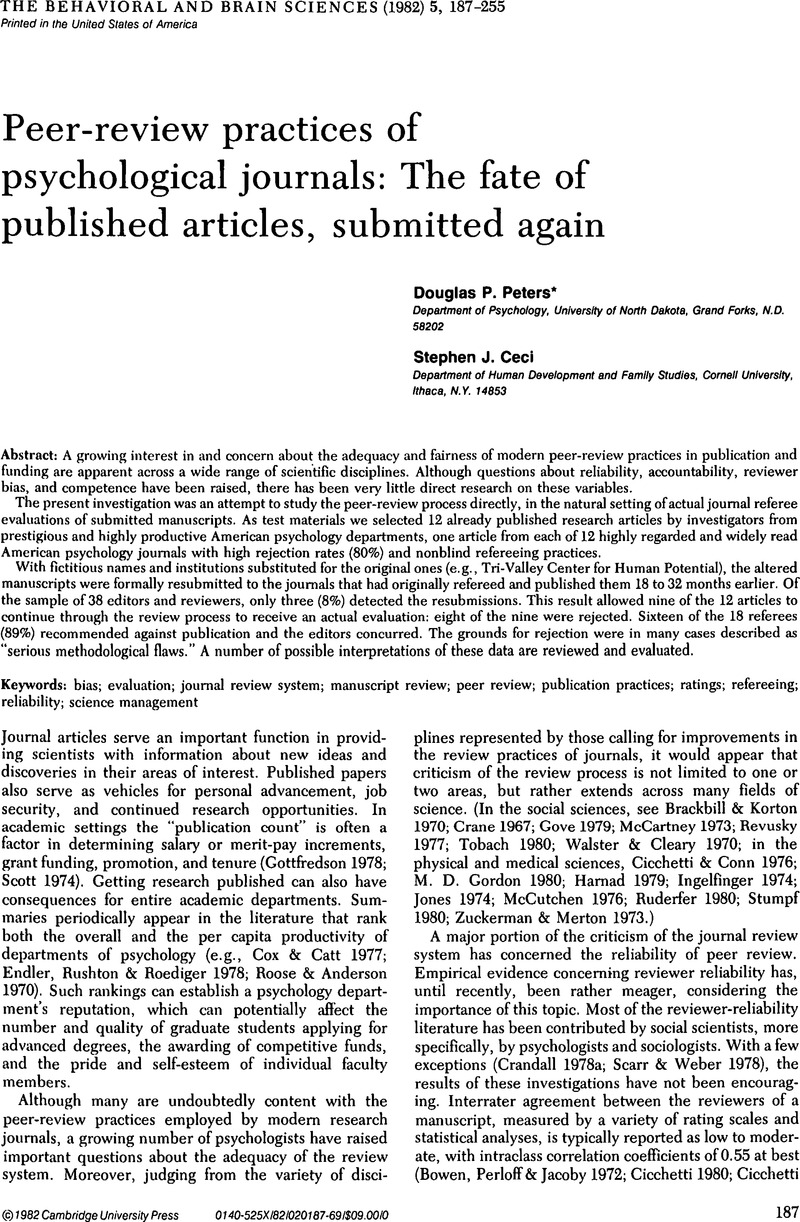Crossref Citations
This article has been cited by the following publications. This list is generated based on data provided by Crossref.
JUSTIZ, MANUEL J.
and
MOORMAN, HUNTER N.
1985.
New NIE Peer Review Procedures.
Educational Researcher,
Vol. 14,
Issue. 1,
p.
5.
Brady, John Paul
1985.
Journal referees: Gatekeepers of science.
Biological Psychiatry,
Vol. 20,
Issue. 8,
p.
823.
Hall, W.
Andrews, G.
and
Goldstein, G.
1985.
The Costs of Schizophrenia.
Australian & New Zealand Journal of Psychiatry,
Vol. 19,
Issue. 1,
p.
3.
Boots, Sharon G.
1986.
Editorial.
Journal of Pharmaceutical Sciences,
Vol. 75,
Issue. 2,
p.
221.
ELLIS, P. M.
MELLSOP, G. W.
PEACE, K. A.
and
WILSON, J. M.
1987.
Peer review as an aid to improving the completeness of psychiatric case notes.
Medical Education,
Vol. 21,
Issue. 6,
p.
493.
Singer, Benjamin D.
1989.
The Criterial Crisis of the Academic World*.
Sociological Inquiry,
Vol. 59,
Issue. 2,
p.
127.
Garden, Gillian
Oyebode, Femi
and
Cumella, Stuart
1989.
Audit in psychiatry.
Psychiatric Bulletin,
Vol. 13,
Issue. 6,
p.
278.
1990.
Planet Earth–A Geographer's Perspective.
Journal of Geography,
Vol. 89,
Issue. 3,
p.
133.
Schwartzman, Roy
1997.
Peer review as the enforcement of disciplinary orthodoxy.
Southern Communication Journal,
Vol. 63,
Issue. 1,
p.
69.
Armstrong, J. Scott
1997.
Peer review for journals: Evidence on quality control, fairness, and innovation.
Science and Engineering Ethics,
Vol. 3,
Issue. 1,
p.
63.
RUNESON, GORAN
and
LOOSEMORE, MARTIN
1999.
Gate-keepers or judges: peer reviews in construction management.
Construction Management and Economics,
Vol. 17,
Issue. 4,
p.
529.
2001.
The Culture of Conformism.
p.
156.
2001.
The Culture of Conformism.
p.
58.
2001.
The Culture of Conformism.
p.
13.
2001.
The Culture of Conformism.
p.
119.
2001.
The Culture of Conformism.
p.
161.
2001.
The Culture of Conformism.
p.
87.
Hojat, Mohammadreza
Gonnella, Joseph S.
and
Caelleigh, Addeane S.
2003.
Impartial Judgment by the “Gatekeepers” of Science: Fallibility and Accountability in the Peer Review Process.
Advances in Health Sciences Education,
Vol. 8,
Issue. 1,
p.
75.
Snodgrass, Richard
2006.
Single- versus double-blind reviewing.
ACM SIGMOD Record,
Vol. 35,
Issue. 3,
p.
8.
Snodgrass, Richard T.
2007.
Editorial.
ACM Transactions on Database Systems,
Vol. 32,
Issue. 1,
p.
1.


